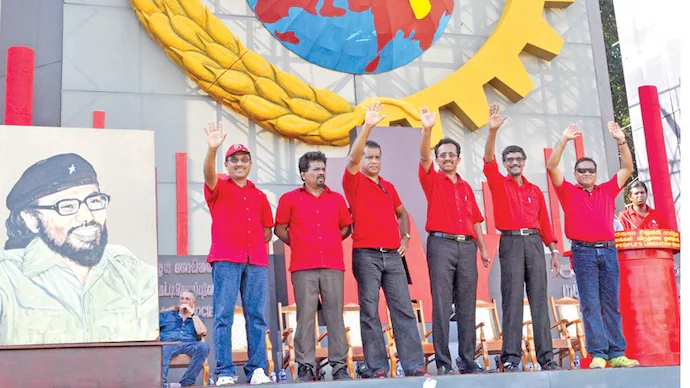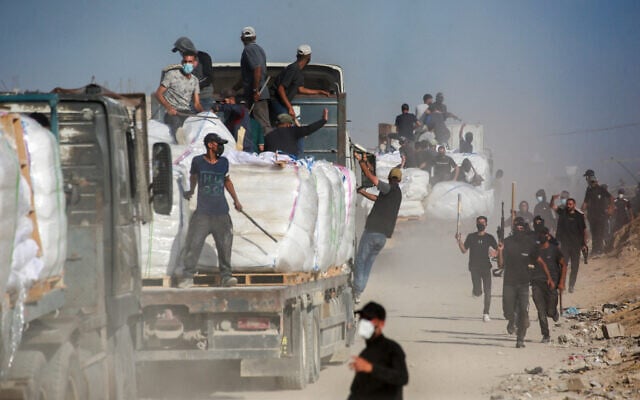For the first time in Sri Lanka’s political history, a party with a red hue and the hammer and sickle, the Janatha Vimukthi Peramuna (JVP), has seized power. It is well-known that the principal leader of the party, Rohana Wijeweera, was inspired by Maoism. Now, how close the JVP was or was not to Maoism is not a matter of discussion; rather, the point is that a cadre-based Marxist-Leninist party is in power to control Sri Lanka’s foreign policy for the first time. The fundamental question is how China will try to envelop this period. For the Chinese Communist Party (CCP), the current political environment in Sri Lanka seems to be relatively favorable for fostering ties between Beijing and Colombo more than ever before. Given this background, the author finds the recent news item of great interest.
Recently it was reported that a bilateral political agreement would be reached between the JVP and the CCP. JVP General Secretary Tilvin Silva will lead the delegation to China for the signing of the Memorandum of Understanding (MoU), with the visit expected to take place before April, the news further noted. In November 2024, a Chinese delegation led by Sun Haiyan, Vice Minister of the International Department of the Communist Party of China Central Committee, held talks with Tilvin Silva at the JVP Head Office in Colombo.
Looking back at the context, in December 2023, Anura Kumara Dissanayake visited China. During this visit, the JVP delegation met Sun Haiyan and discussed strengthening political collaborations between the two parties. Anura Kumara Dissanayake visited New Delhi as his first diplomatic trip after being elected President. The day after he returned to Colombo from Delhi, a delegation led by Ms. Qin Boyong, Vice Chairperson of the National Committee of the Chinese People’s Political Consultative Conference (CPPCC), was waiting for him in Colombo. Boyong noted that China looks forward to continuing its work with the new government of Sri Lanka, further strengthening the longstanding relationship between the two countries. This was a symbolic event showing how keen China has been on its moves into Sri Lanka. Dissanayake’s first diplomatic trip to New Delhi was seen as a positive step in India’s “Neighbourhood First Policy”. Furthermore, it also led to the appearance that they had changed a lot from JVP’s earlier anti-India assertiveness. However, the China-JVP relations are extensive and historical. The JVP-India relations came to the spotlight only after the delegation led by Anura Kumara visited New Delhi for the first time in history in February 2024 at the official invitation of India.
The idea of learning governance from the CCP is a new phenomenon in Sri Lanka’s political culture. For the first time in Sri Lanka, a high-level discussion on governing exchanges between the ruling parties of the two countries was held during the tenure of Gotabaya Rajapaksa. The general election was held on August 5, 2020. In this election, the Rajapaksa-led Sri Lanka Podujana Peramuna (SLPP) won a landslide victory with 145 seats. Following this, on August 26, Song Tao, Minister of the International Department of the Communist Party of China Central Committee, held video talks with leaders of the SLPP. On behalf of the SLPP, Basil Rajapaksa, Founder and National Organizer, G.L. Peiris, Minister of Education and Chairman of the party, and Sagara Kariyawasam, General Secretary of the SLPP, participated in this talk.
“The Communist Party of China (CPC) is willing to work with the SLPP to implement the important consensus reached by leaders of both countries, give play to the political guidance of exchanges between ruling parties, and promote cooperation such as the high-quality construction of the Belt and Road Initiative, so as to better benefit the two peoples,” Song stated.
Is this the subsequent stage in boosting Sri Lanka’s ties with the CCP?
The JVP has been a party bonded with China since its inception. In 2004, the former leader of JVP Somawansa Amarasinghe visited China and signed an agreement with the Chinese Communist Party. The agreement was signed to secure political and financial support. However, this relationship has not been highlighted much in the public eye. The JVP was long seen as a low-profile party in Sri Lanka. This may be one of the reasons why JVP – CCP relations were dim.
Considering Sri Lanka’s proximity to India and major sea routes, it raises the question of whether the political agreement between the JVP and the CCP is prudent, and what potential consequences could arise if the JVP makes unwise decisions.
Should the JVP make imprudent choices, their collaboration with the CCP would essentially support China’s global ambitions. The United States Department of State has stated that “the Chinese Communist Party (CCP) poses the central threat of our times, undermining the stability of the world to serve its own hegemonic ambitions.” Although it is difficult to gauge China’s foreign policy mechanisms, but it is clear that China practices the “Partyisation” of politics. Despite the appearance of diverse policy actors with differing views, the Chinese Communist Party predominantly dictates China’s foreign policy. Since Xi Jinping assumed leadership in 2012, the CCP’s agenda has been geared towards affirming China’s global influence. As Ian Johnson writes for the Council on Foreign Relations, Xi’s strategy is, “Run the party and you run China.”
China’s interest in increasing its political presence in Sri Lanka is evident. The long-term goal of China in South Asia is to counterbalance India’s traditional influence in the region. China’s strategy involves encircling India, hindering its growth, and establishing a sphere of influence in South Asia to impede India’s movements. China employs two main approaches: leveraging economic dependencies to expand its influence and building strong relationships with political parties that can align with China’s interests, thereby instilling the belief among political elites that China is indispensable.
Viewed in this context, the JVP-CCP political alliance seems poised to further China’s objectives. This partnership is unlikely to be advantageous for the people of Sri Lanka and will certainly be a disadvantage to them. The JVP needs to exercise foresight and regional responsibility. Despite President Anura Kumara Dissanayake’s statement during his first visit to India that “We don’t want to be sandwiched, especially between China and India” his foreign policy approach now appears inverted and could drag the country into a geopolitical quagmire.




